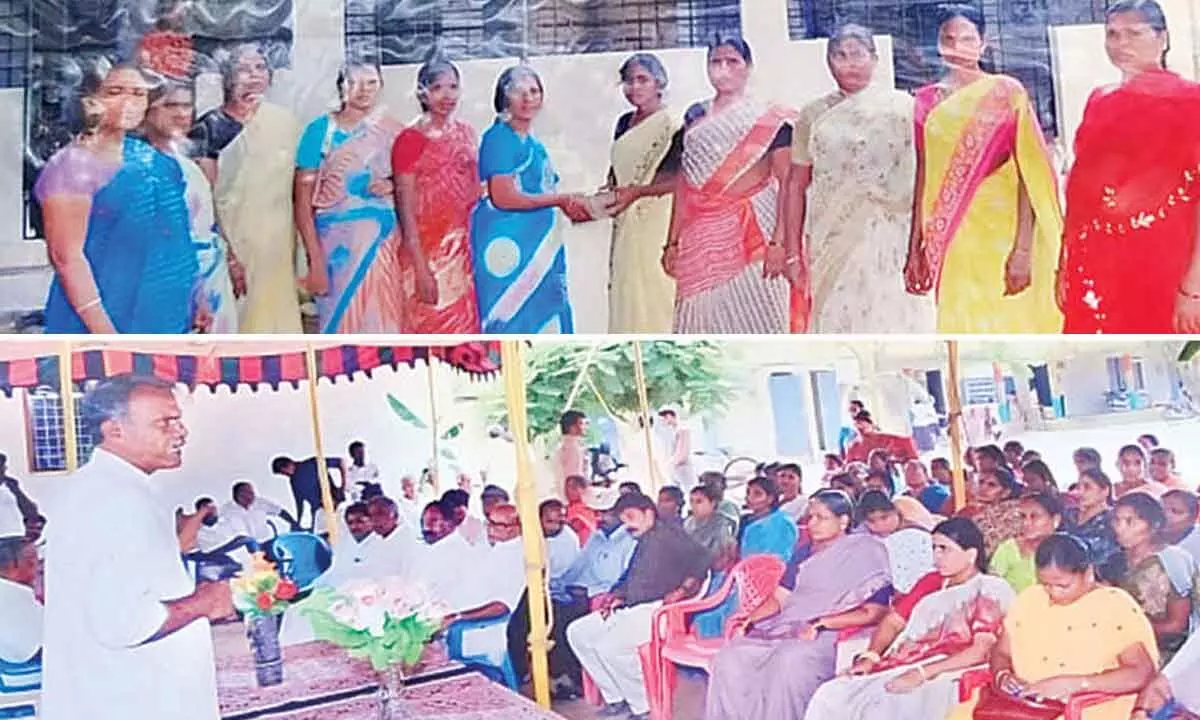Leguntapadu, a testimony to empowerment of women

Nellore : Leguntapadu, a village in Kovur Mandal of Nellore district, has undergone a profound transformation over the past 25 years, evolving from a state of poverty and oppression to a model of women's empowerment and economic prosperity.
Historically, the women of Leguntapadu were confined to domestic chores, cattle grazing, and agricultural labour, with limited access to education and financial resources. Many had never seen a hundred rupee note or envisioned living in a pucca house. The catalyst for change was the formation of Self-Help Groups (SHGs) in the village. In 1992, the Anti-Arrack Movement (AAM) ignited the collective spirit of Leguntapadu's women, leading them to challenge social injustices.
This movement was bolstered by the Total Literacy Campaign spearheaded by former collector Koppula Raju, which elevated literacy rates from nearly zero to 95% over three decades.
Building on this momentum, in 1998, Gunipati Prasad Reddy encouraged the establishment of a 30-member SHG with an initial capital of Rs 40,000. Inaugurated by then Andhra Pradesh Governor C Rangarajan on October 30, 1998, this initiative laid the foundation for what would become the Kovur Podupulakshmi Mutually Aided Co-operative Society (MACS). Today,
Podupulakshmi Bank boasts over 20,000 members across 1,500 SHGs, with an annual turnover of Rs 15 crore. The bank provides loans to 25 villages without requiring collateral and is poised to double its turnover in the coming fiscal year. This success has attracted financial institutions like HDFC and ICICI, which have extended Rs 10 crore to the SHGs to further stimulate economic activities.
The impact of these initiatives is evident in the lives of Leguntapadu's women. Many have transitioned from agricultural laborers to entrepreneurs, managing dairy farms, cottage industries, and engaging in bank transactions. For instance, V. Ademma, who studied only up to Class V and once worked as an agricultural labourer, now operates her own rice trading business with support from Podupulakshmi Bank. Similarly, Manjula Reddy, who struggled to support her family two decades ago, now provides quality education for her children in a reputed school.
Women have also ventured into businesses such as poultry farming, dairy production, incense stick manufacturing, and betel leaf cultivation, yielding substantial returns and contributing to the village's economic growth.
A notable figure in this transformation is BB John, the current president of MACS. Married at 13 and widowed early, she once contemplated suicide. However, inspired by the literacy movement, she pursued education up to Class VIII and emerged as a leader of Podupulakshmi Bank. Her efforts have been recognised with several government awards, and she stands as a symbol of resilience and empowerment.
The empowerment of women in Leguntapadu has led to broader social changes. The village, once known for political violence has become a haven of peace and harmony. Education, financial independence, and social awareness have fostered a community where women's voices are heard and respected. Even Muslim women in the village, who once refrained from family planning, have embraced modern practices. The profound social transformation has attracted intellectuals, economists, and social scientists to study Leguntapadu's success.
Leguntapadu's journey from despair to hope exemplifies the power of collective effort, education, and self-reliance. From poverty-stricken agricultural laborers to empowered entrepreneurs, the women of Leguntapadu have rewritten their destiny, demonstrating that with education, unity, and hard work, even the most marginalised communities can achieve greatness.


